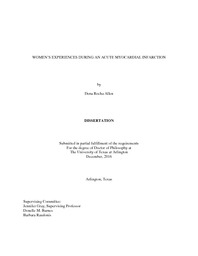
ATTENTION: The works hosted here are being migrated to a new repository that will consolidate resources, improve discoverability, and better show UTA's research impact on the global community. We will update authors as the migration progresses. Please see MavMatrix for more information.
Show simple item record
| dc.contributor.advisor | Gray, Jennifer R. | |
| dc.creator | Allen, Dena R. | |
| dc.date.accessioned | 2018-03-08T16:48:59Z | |
| dc.date.available | 2018-03-08T16:48:59Z | |
| dc.date.created | 2016-12 | |
| dc.date.issued | 2016-11-29 | |
| dc.date.submitted | December 2016 | |
| dc.identifier.uri | http://hdl.handle.net/10106/27250 | |
| dc.description.abstract | Objective: The objective was to describe the lived experience of women having a myocardial infarction and seeking health care, using the framework of the stress and coping theory (Lazarus & Folkman, 1984).
Setting: Three acute care hospitals in a major metropolitan area in the North Texas region were the settings for the study.
Method: A total of 20 English speaking women were interviewed about their experience when having an acute myocardial infarction from the onset of their symptoms through their hospital stay. The interview questions and findings were aligned with the stress and coping theory concepts.
Results: The women realized they were experiencing a clinical situation when more than two symptoms began to emerge. They experienced fatigue/exhaustion, shortness of breath, sweating/being hot, and chest sensations, not necessarily pain. Women experienced some form of radiating pain that was not necessarily heart related during their myocardial infarction experience. The breaking point of when the women decided to seek health care was when they were no longer able to tolerate the severity of the sensations they were experiencing. Women knew they were having a myocardia infarction and would deny, rationalize, second guess or minimize the pain and would delay seeking health care. At times, women experienced a lack of urgency from healthcare providers. Some women experienced misinterpreted EKG which caused a delay in identifying the myocardial infarction. Although women had personal barriers to seeking health care, they also had other physical barriers to seeking care. Delayed ambulance transportation, road construction, preconceived ideas of women not having cardiac risk factors, and lack of insurance caused unexpected outcomes for the women having a myocardial infarction.
Conclusions: Women reported unique experiences when having a myocardial infarction. No patterns were distinguished when women had their myocardial infarction. More research is needed to explore the experience of non-English speaking women having a myocardial infarction and the types of procedure they endure. | |
| dc.format.mimetype | application/pdf | |
| dc.language.iso | en_US | |
| dc.subject | Women | |
| dc.subject | Myocardial infarction | |
| dc.subject | Heart attack | |
| dc.subject | Cardiac | |
| dc.subject | Delay seeking care | |
| dc.subject | Cardiac symptoms | |
| dc.subject | Barriers to seeking care | |
| dc.title | Women's Experiences During an Acute Myocardial Infarction | |
| dc.type | Thesis | |
| dc.degree.department | Nursing | |
| dc.degree.name | Doctor of Philosophy in Nursing | |
| dc.date.updated | 2018-03-08T16:49:00Z | |
| thesis.degree.department | Nursing | |
| thesis.degree.grantor | The University of Texas at Arlington | |
| thesis.degree.level | Doctoral | |
| thesis.degree.name | Doctor of Philosophy in Nursing | |
| dc.type.material | text | |
| dc.creator.orcid | 0000-0001-7678-7864 | |
Files in this item
- Name:
- ALLEN-DISSERTATION-2016.pdf
- Size:
- 991.6Kb
- Format:
- PDF
This item appears in the following Collection(s)
Show simple item record


